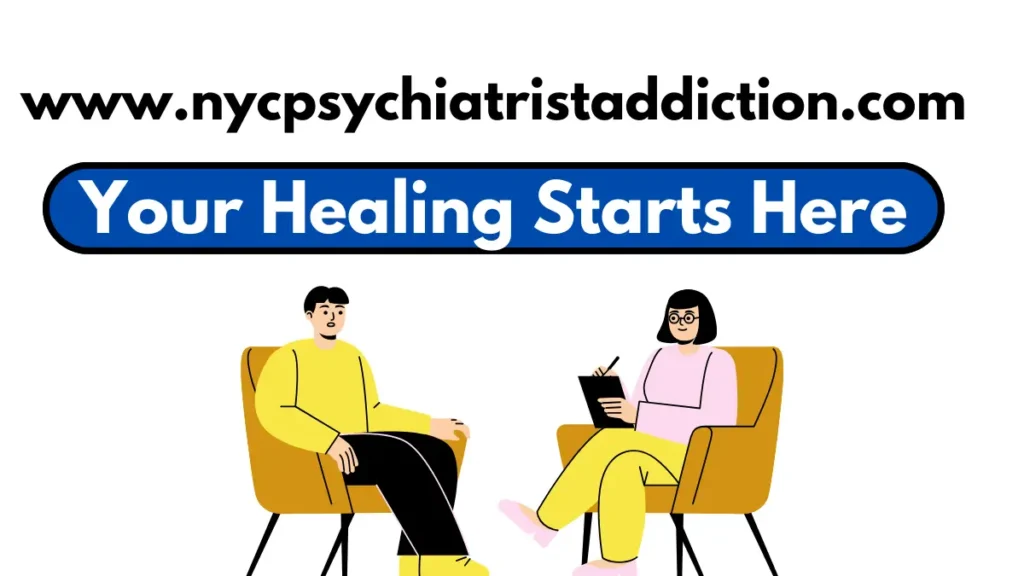The Impact of Trauma on Addiction: NYC Psychiatrists’ Approach to Co-Occurring Disorders
By recognizing and treating the underlying trauma that fuels addiction, psychiatrists in NYC offer patients a pathway to healing that goes beyond just abstaining from substances, focusing instead on long-term emotional recovery and well-being.

Addiction is rarely a standalone issue. Many individuals who struggle with substance use disorders also have underlying mental health conditions, often related to trauma. Trauma—whether from childhood abuse, violence, neglect, or other distressing experiences—can profoundly shape a person’s psychological well-being and increase the likelihood of developing addiction. In New York City, where individuals face unique environmental stressors, addressing both trauma and addiction simultaneously is crucial for long-term recovery. NYC psychiatrists play a key role in helping patients understand the connection between trauma and addiction and in treating co-occurring disorders. This article explores the ways in which trauma contributes to addiction, how NYC psychiatrists approach these cases, and the therapeutic interventions used to address both issues.
The Relationship Between Trauma and Addiction
Trauma is often a significant factor in the development of addiction. Whether it’s an isolated traumatic event or ongoing exposure to stress and adversity, trauma can shape an individual’s coping mechanisms and lead them to seek out substances to numb emotional pain. The relationship between trauma and addiction can manifest in several ways:
-
Self-Medication: One of the most common ways trauma and addiction are linked is through self-medication. Many individuals turn to substances such as alcohol, opioids, cocaine, or marijuana to cope with the painful memories, emotional pain, or anxiety stemming from traumatic experiences. This temporary relief can lead to dependency and addiction, as the individual repeatedly uses substances to avoid confronting their trauma.
-
Chronic Stress and Dysregulation: Trauma can cause chronic stress and dysregulation of the brain’s reward and stress systems. Individuals who have experienced trauma may have heightened levels of anxiety, depression, or hypervigilance, which can make them more vulnerable to using substances as a way to manage their emotional state. Additionally, trauma can impair the ability to regulate emotions, making it harder to manage the emotional fallout of addiction.
-
Post-Traumatic Stress Disorder (PTSD): Trauma survivors often develop PTSD, a condition that can exacerbate substance use disorders. The symptoms of PTSD—such as flashbacks, nightmares, hyperarousal, and emotional numbness—can lead individuals to use substances to escape or dull the emotional and physical pain of their trauma. Many individuals with PTSD also experience depression and anxiety, making the cycle of addiction even more complex.
In NYC, where the pace of life is fast, and individuals are exposed to a variety of stressful situations, the prevalence of trauma-related addiction is particularly high. From exposure to violence and crime to the stresses of economic inequality, many people in NYC struggle with trauma that contributes to substance use disorders.
Approaches to Treating Co-Occurring Trauma and Addiction
Given the intertwined nature of trauma and addiction, it’s critical that treatment addresses both issues simultaneously. NYC psychiatrists use an integrated approach to treat co-occurring trauma and addiction, employing a combination of trauma-informed care and addiction treatment strategies. This integrated approach ensures that both the physical and emotional components of addiction are addressed, leading to better long-term outcomes.
-
Trauma-Informed Care: Trauma-informed care is a key philosophy adopted by NYC psychiatrists when treating individuals with both trauma and addiction. This approach involves understanding the prevalence and impact of trauma, recognizing how it can affect a patient’s behavior, and tailoring treatment to ensure that patients feel safe, respected, and empowered. Trauma-informed care emphasizes creating a therapeutic environment where patients feel understood and supported, rather than judged or retraumatized.
-
Integrated Treatment Models: NYC psychiatrists often use integrated treatment models to address co-occurring trauma and addiction. These models recognize that the two issues are interconnected and should be treated together, rather than in isolation. Integrated treatment may include a combination of psychotherapy, medications, and social support to address both the addiction and the underlying trauma. Psychiatrists may collaborate with social workers, counselors, and addiction specialists to develop a comprehensive treatment plan that meets the individual’s needs.
-
Cognitive Behavioral Therapy (CBT) for Trauma and Addiction: CBT is one of the most widely used therapeutic approaches for treating both trauma and addiction. In the context of co-occurring disorders, CBT helps individuals identify and change maladaptive thought patterns that contribute to both their trauma-related distress and their substance use. By addressing the distorted thoughts and behaviors that arise from traumatic experiences, CBT helps patients develop healthier coping strategies, reduce substance use, and work through their trauma in a structured way. In NYC, where many individuals have faced various forms of trauma, CBT is a common and effective approach for treating co-occurring addiction and trauma.
-
Trauma-Focused Cognitive Behavioral Therapy (TF-CBT): A specialized form of CBT, TF-CBT is specifically designed to address trauma in individuals who are also dealing with addiction. TF-CBT focuses on processing traumatic memories in a safe, controlled manner while helping the individual develop coping strategies to manage the emotional distress that arises from these memories. This form of therapy is particularly useful for individuals with complex trauma histories and is commonly used by NYC psychiatrists treating patients with PTSD and substance use disorders.
-
Dialectical Behavioral Therapy (DBT): DBT is another therapy commonly used for individuals with both addiction and trauma. Originally developed to treat borderline personality disorder, DBT is effective for individuals who struggle with emotional regulation, a common challenge for trauma survivors. DBT helps patients develop skills in emotional regulation, mindfulness, distress tolerance, and interpersonal effectiveness. For trauma survivors, DBT can be particularly useful in helping individuals manage emotional pain without resorting to substance use as a form of self-soothing.
-
Eye Movement Desensitization and Reprocessing (EMDR): EMDR is a specialized form of therapy that has proven effective for individuals with trauma-related addiction. EMDR involves guided eye movements while the patient recalls traumatic memories. This process helps to reprocess the trauma in a way that reduces its emotional charge. EMDR is particularly effective for individuals with PTSD who may find it difficult to engage in traditional talk therapies. NYC psychiatrists who specialize in trauma treatment often use EMDR as part of an integrated treatment plan for addiction and trauma.
-
Medication-Assisted Treatment (MAT) for Trauma and Addiction: Medication plays an important role in the treatment of both trauma and addiction. For individuals with co-occurring PTSD and addiction, medications such as antidepressants (e.g., SSRIs), anxiolytics, and mood stabilizers may be prescribed to help manage symptoms of depression, anxiety, and hyperarousal. In addition, medications like methadone, buprenorphine, and naltrexone can help stabilize the individual’s substance use disorder. NYC psychiatrists use a combination of medications tailored to the individual’s needs to ensure that both the trauma-related symptoms and the addiction are managed effectively.
Challenges in Treating Trauma and Addiction
Treating co-occurring trauma and addiction presents several challenges. One of the primary obstacles is that trauma survivors may be reluctant to engage in treatment due to fear of re-traumatization. In some cases, individuals may be unaware of the connection between their trauma and their addiction, and it may take time to help them understand how these issues are interrelated. Additionally, individuals with both trauma and addiction may face difficulty in maintaining treatment due to relapse triggers or overwhelming emotional distress.
Another challenge is the stigma surrounding both trauma and addiction. Many individuals may feel ashamed or embarrassed about their history of trauma, particularly if it involves sexual abuse, violence, or neglect. This shame can prevent them from seeking help, further complicating the recovery process.
The Path to Healing
Despite these challenges, many individuals in NYC have successfully overcome both trauma and addiction with the help of skilled psychiatrists. By addressing both issues simultaneously, individuals are better able to process their traumatic experiences, develop healthier coping strategies, and break the cycle of addiction. Through a combination of trauma-informed care, therapy, medication, and social support, individuals can heal from both their past trauma and their addiction, leading to long-term recovery and improved mental health.
Conclusion
The impact of trauma on addiction is undeniable, and NYC psychiatrists are at the forefront of helping individuals navigate the complex intersection of these two conditions. Through an integrated approach that combines trauma-informed care, psychotherapy, medication, and social support, psychiatrists help individuals address both the emotional and behavioral components of addiction.
What's Your Reaction?






















